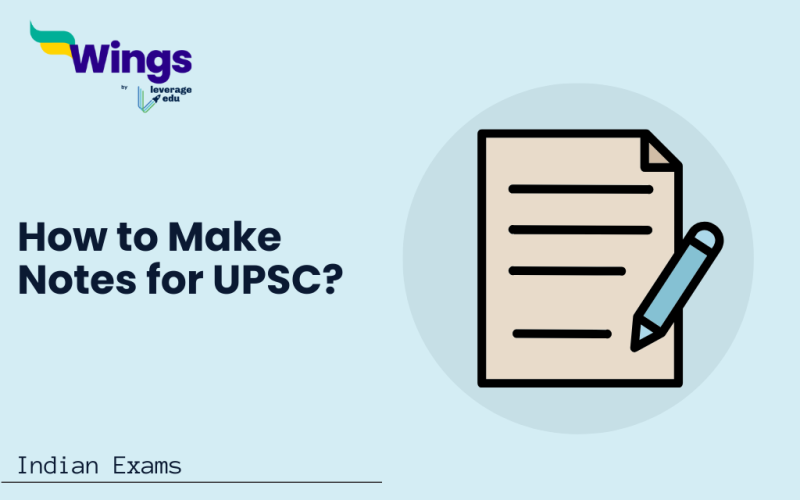To effectively prepare for the UPSC exam, a systematic method requiring in-depth research, concentrated study, and well-timed note-taking is required. These notes serve as a helpful upsc roadmap to help you easily retain and rewrite key concepts amidst the overflow of information. A balanced approach is required for the UPSC exam. You can spend more time on the areas that want improvement by using your notes to help you identify your strengths and weaknesses.
How to Make Notes for UPSC?
For an aspirant, learning how to take notes for the UPSC Exam is very important. You can use mind maps instead of linear format. Focus on creating integrated subject-specific notes that will help you prepare for both the Prelims and Mains exams rather than dividing your time between creating individual notes for each exam. You can utilize this for your last-minute edits and save time and effort.
Steps for Effective Note-making for the UPSC IAS Exam
- Use an A4 spiral exercise book with separators for different subjects.
- Utilize a pen and color highlighter.
- Avoid recording every line.
- Differentiate major and minor points using capital letters, boxes, asterisks, underlining, and highlighting.
- Avoid complete sentences; streamline with abbreviations and symbols.
- Link notes to the syllabus.
- Revise notes regularly.
- Add recent updates with sticky notes.
Guidelines for Structure
- Include: What, When, Why, How, Current relevance, and Final comments.
- Develop a personal abbreviation system.
- Jot down the previous year’s UPSC mains questions related to the topic.
- Use arrows to denote increase and decrease.
- Structure main points with supporting information/facts.
What to Take Down?
- Principles, Concepts, and Theories
- Key highlights
- Examples and real-life illustrations
- Simple diagrams and charts
- Timelines and new words
- Quotations, definitions, and summaries
Helpful Abbreviations
- & : and
- +: in addition to
- =: is equal to
- ≠ : is not the same as
- because
- ↑ : Increases
- ↓ : Decreases
- →: leads to
- w/: with
- e.g.: for example
- etc.: and the rest
- NB : Important
- no. : Number
Types of Note-making
- Linear Notes: Outline format, flexible, follows the order of points made.
- Branching Notes: Mind maps or spidergrams, a central topic with branches for different topics, help widen perspective.
After Making Notes
- Critically review notes.
- Regularly revise notes.
- Scan main contents, reasons, key features, advantages, disadvantages, impacts, pros, and cons.
Perfect Note Making Strategy for the UPSC Exam
Recognize your preferred method of studying before you begin taking notes. Are you a visual learner who finds charts and diagrams helpful? Or do you feel more at ease with the knowledge that is written down? You can use flowcharts, graphs, and visual patterns in your notes to customize them to your tastes. These customized components improve comprehension and increase the fun of learning.
Transform difficult concepts into easily understood, crisp statements in your native tongue. When summarising long sections, make sure to capture the main ideas of the text. To properly arrange your notes, use headings, subheadings, and bullet points. You will benefit from this practice in writing your UPSC Mains answer sheet.
Combine current affairs with your subject notes. Update your notes with recent events, current affairs, and policy changes to keep them up to date. Update your notes frequently to include the most recent information. Having a consolidated set of notes will reduce the number of sources you need to consult and help in your overall preparation for the Prelims and Mains.
Importance of Making Notes for the UPSC Exam
The UPSC Examination preparation process requires commitment, planning, and a thorough approach. Of all the strategies at your disposal, taking notes is one of the most important and basic methods that can greatly increase your chances of success. The following are some reasons why taking notes is a crucial component in preparing for the UPSC exam:
- The UPSC notes serve as a consolidated version of the comprehensive syllabus. You can simplify difficult topics and make them easier to remember and edit by taking brief notes. These notes serve as a convenient quick reference resource for effective revision as the exam date approaches.
- It is during your long study sessions that you come across a tonne of material. Making notes requires you to review the information, pick out the important elements, and arrange them rationally. This clarity facilitates a deeper comprehension of the subject.
- Your notes demonstrate how you have personally understood and interpreted the material. Going over your notes brings up recollections of when you first learned the information, which facilitates re-engaging with the subject matter.
- It can take some time to find specific information in large volumes of textbooks and study materials. Your notes act as a personal index, giving you quick access to important ideas and information.
Making notes for the UPSC is a dynamic process that fits your learning style, maximizes review, and helps you remember important information. It’s not just a passive. Your notes become your best friends, helping you go through the UPSC syllabus and serving as proof of your diligent study
RELATED POSTS
This was all about the “How to Make Notes for UPSC?”. For more such informative blogs, check out our UPSC Exams Section, or you can learn more about us by visiting our Indian exams page.
 One app for all your study abroad needs
One app for all your study abroad needs













